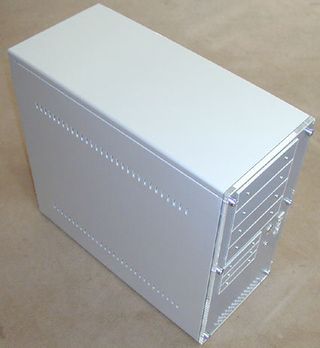How To Select The Right Case
The Wallet Test Does Not Always Lead To Buying The Best Case
Like a high-end monitor, if you so choose, you are able to continue to use the same case over and over through the majority of upgrades to your PC. Of course, this means that, as you would expect, higher quality cases do carry a premium price tag.

Our own Patrick Schmid looked at the Progressive Housing Tower a while back. He found it a very attractive case with a high price tag to match.
Aluminum is expensive to produce, so this means that you will pay a premium for aluminum cases. If you like the reduced weight and snazzy look of aluminum, then one of these might be the case for you, but be aware that the trend towards aluminum isn't lost on vendors, and some of them are producing less than stellar quality aluminum cases.
The lack of sharp edges within the case can be an indication of the overall quality of the case's construction. (It also makes you less likely to cut yourself.) In order to achieve the mission of getting the best case, you should be prepared to spend some money. A check with local retailers in our area found that higher quality cases tend to start at a minimum of $75, and can reach as high as $300 depending on the options and construction materials.
However, we also found cases where the quality of construction was not up to snuff, yet retailers were still charging a premium for them. Many of these cases were of the aluminum variety, so we recommend that if you are going to go shopping for an aluminum case especially, you should pay extra attention to the quality and construction of the case. Once again, it just goes to show that buying the most expensive case doesn't always mean you're getting the best case for your money.
Stay on the Cutting Edge
Join the experts who read Tom's Hardware for the inside track on enthusiast PC tech news — and have for over 25 years. We'll send breaking news and in-depth reviews of CPUs, GPUs, AI, maker hardware and more straight to your inbox.
Current page: The Wallet Test Does Not Always Lead To Buying The Best Case
Prev Page What Makes A Good Case? Continued Next Page Power Supplies Can Also Be A PitfallMost Popular

